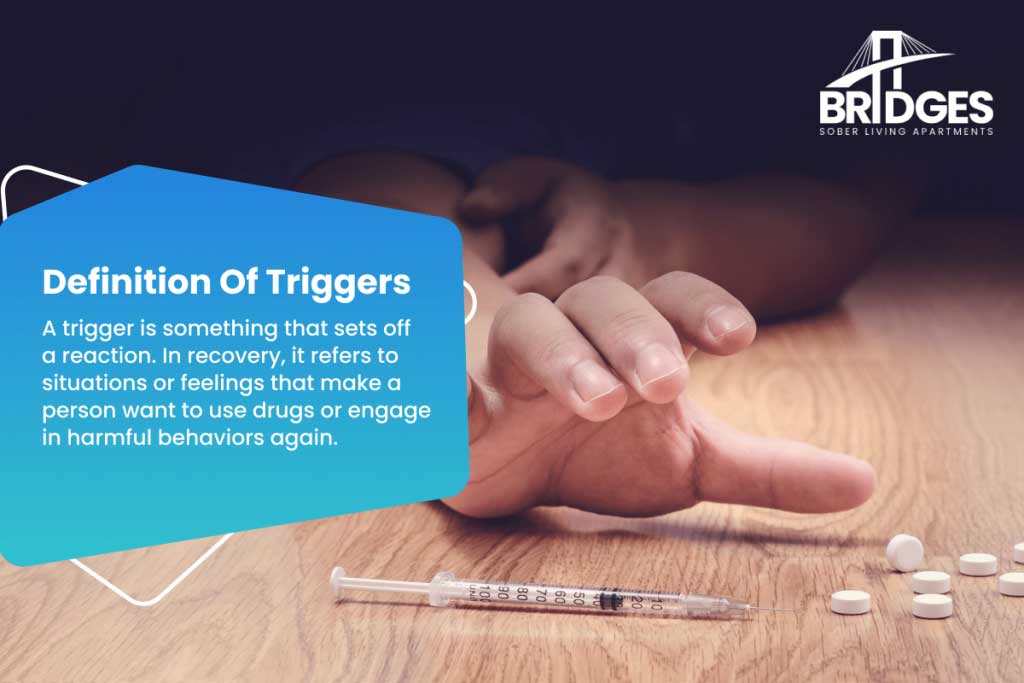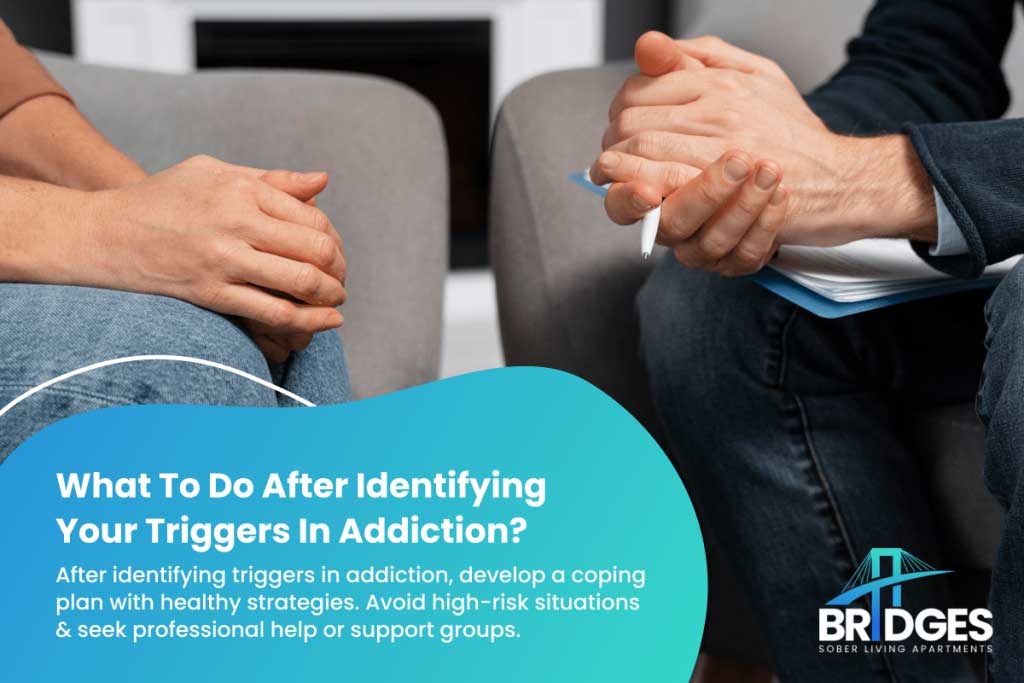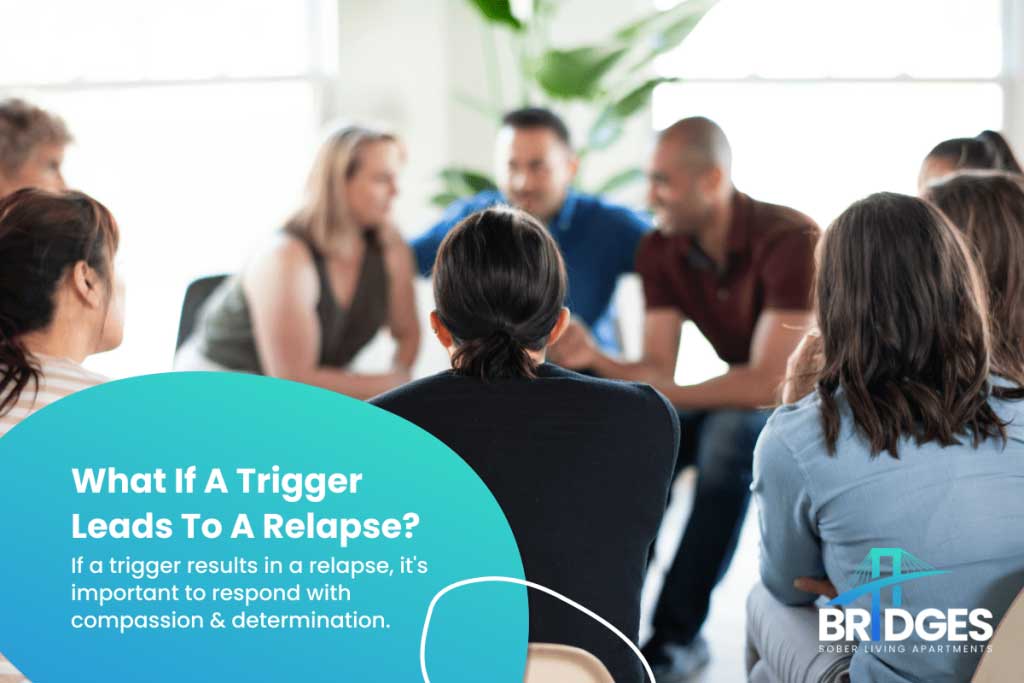
A trigger is something that sets off a reaction. In recovery, it refers to situations or feelings that make a person want to use drugs or engage in harmful behaviors again. Triggers can be external, like being in a place where drugs or alcohol were previously used, or internal, such as feeling stressed, sad, or anxious. They can also be related to certain people, memories, stressful situations, or even specific times of the day.
In recovery from addiction, individuals may encounter various triggers that can challenge their sobriety and potentially lead to relapse. Here are some common relapse triggers:
External Triggers: These are factors in the external environment that can stimulate cravings and addictive behaviors. They include:
People: Being around family members or peers who use drugs or alcohol or who are associated with your past addictive behavior.
Places: Visiting locations where you used to engage in your addictive behavior.
Things: Objects or paraphernalia associated with your addiction, such as drug-related items or tools.
Events: Attending parties, celebrations, or gatherings where substance use is prevalent.
Internal Triggers or Emotional Triggers: These triggers arise from within, often related to emotions and thoughts:
Emotions: Feelings of stress, anxiety, depression, loneliness, anger, or boredom can trigger the desire to use substances as a coping mechanism.
Memories: Recall of past drug use experiences or positive memories associated with substance use can lead to cravings.
Thought Patterns: Negative thought patterns, such as self-doubt or feelings of helplessness, can increase vulnerability to triggers.
Physical Sensations: Physical discomfort, pain, or fatigue can trigger a desire to use substances for relief.
Situational Triggers: These are specific situations or circumstances that can prompt cravings:
Routine: Activities or times of day when you used to engage in addictive substances can trigger cravings due to ingrained habits.
Social Pressure: Peer pressure or the desire to fit in with a certain group can trigger substance use.
Celebrations and Holidays: Special occasions that involve alcohol or drugs can create challenges for individuals in recovery.
Stressors: Stressful life events, such as work-related pressures, relationship issues, financial problems, or major life changes, can trigger the urge to use substances to cope.
These triggers can vary significantly from person to person due to a wide range of individual differences and life experiences. What may be a powerful internal or external stimulus for one individual in recovery might have little to no effect on another.
Identifying addiction triggers in recovery is crucial for maintaining sobriety and achieving long-term success. By recognizing and understanding these triggers, individuals can develop coping strategies, avoid high-risk situations, and manage their cravings effectively. This self-awareness helps create a solid foundation for a sustainable recovery journey, promoting healthier behaviors and reducing the risk of relapse.
Recognizing triggers offers a host of benefits that contribute significantly to recovery:
Improved self-control: Recognizing triggers allows individuals to proactively manage impulses and make conscious choices, fostering better self-control over their behaviors.
Enhanced coping skills: Awareness of triggers encourages the development of healthier strategies to cope with stress and emotions.
Reduced vulnerability to triggers’ effects: Understanding triggers helps individuals prepare for and resist the lure of harmful behaviors or substances.
Strengthened ability to navigate challenging situations: Trigger recognition empowers individuals to face difficulties proactively and find constructive solutions.
Identifying triggers involves a process of self-awareness and observation. Here are steps to help you identify your triggers:
Self-reflection: Take time to reflect on your thoughts, emotions, and behaviors in various situations. Look for patterns of reactions, cravings, or changes in mood.
Keep a journal: Maintain a journal where you record environmental events, situations, or emotions that provoke strong responses or cravings. Write down how you feel and how you react to each trigger.
Notice changes in behavior: Pay attention to any sudden changes in your behavior, such as increased stress and irritability.
Mindfulness practice: Practice mindfulness to be fully present in the moment. Mindfulness helps you observe your thoughts and emotions without judgment, making it easier to recognize triggers as they arise.
Take note of high-stress situations: Stress can be a significant trigger for many people. Keep track of situations that cause stress and examine your reactions.
If you’re having difficulty identifying triggers on your own, consider talking to a therapist or counselor. They can help you explore your emotions and experiences more deeply and provide valuable insights.
Remember, identifying triggers is a gradual process. Be patient with yourself, and keep an open mind as you explore your thoughts, emotions, and reactions. Understanding your triggers can lead to improved coping strategies and emotional well-being.
It's important to know what to do when someone arou and you triggers you, it will help you feel prepared and cope with the situation better. Some techniques you can use are-

After identifying triggers in addiction, develop a coping plan with healthy strategies. Avoid high-risk situations and seek professional help or support groups. It is also important to practice stress management techniques, build a strong support system, and prioritize self-care. When you address triggers and implement coping mechanisms, you can maintain lasting sobriety.
Coping techniques are vital even in the early stages of recovery, encompassing substance use disorders, behavioral addictions, and prevalent triggers. Here are some examples of coping techniques:
Mindfulness and Meditation: Practicing mindfulness and meditation helps increase self-awareness and manage stress by staying focused on the present moment.
Cognitive-Behavioral Strategies: Cognitive-behavioral techniques involve identifying and changing negative thought patterns and behaviors associated with addiction.
Healthy Lifestyle (Exercise, Nutrition, Sleep): Having regular exercise, a regular sleep schedule, and a healthy eating routine contributes to physical and mental well-being, supporting recovery.
Support Groups: Participating in support groups provides a sense of community and understanding among peers who share similar challenges and experiences.
Stress Management Techniques: Learning stress reduction techniques such as deep breathing, relaxation, and mindfulness helps manage stress-induced triggers.
Identifying Triggers: Recognizing specific triggers, both internal and external, empowers individuals to prepare and respond proactively when faced with triggering situations.
Distraction with Hobbies: Engaging in hobbies and interests provides a positive and engaging way to redirect focus from cravings and triggers.
Strengthening Support Network: Building a strong support system with friends, family, sponsors, or mentors offers encouragement and assistance during difficult times.
Seeking Professional Guidance: Consulting therapists, counselors, and addiction specialists can provide tailored guidance and strategies for effective coping and relapse prevention.
Through these techniques, you can successfully manage cravings, navigate triggers, and pave the way for a sustained recovery.
Continuously reassessing and updating coping strategies is essential throughout the recovery journey, considering the evolving nature of triggers and personal growth. Triggers that once held power may lose their potency as you gain insight and resilience. Conversely, new triggers might emerge from life changes or unexpected stressors.

If a trigger results in a relapse, it’s important to respond with compassion and determination. Acknowledge that setbacks are common in recovery journeys and avoid self-blame. It’s always best to reach out for immediate support from your network, like a sponsor or counselor.
In addition, you may analyze the addiction trigger and your coping strategies to better prepare for similar situations in the future. Learn from the experience: identify vulnerabilities and adjust your approach accordingly. You may also reaffirm your commitment to recovery, reevaluate your goals, and consider seeking professional help. Remember, a relapse doesn’t erase your progress; it’s an opportunity to refine your strategies and strengthen your resolve. Stay focused on your long-term goals and use the setback as motivation to continue working towards sustained sobriety.
There are three types of relapse:
Seeking professional guidance or joining support groups further enhances the recovery process. Trained therapists and counselors provide a safe and non-judgmental space for individuals to unravel their triggers, offering valuable insights and evidence-based coping strategies. Support groups, on the other hand, offer a sense of community, reducing feelings of isolation and fostering encouragement. This comprehensive approach to trigger recognition promotes emotional resilience and sustainable recovery.
Embrace a life of recovery and growth in our welcoming sober living home. From structured routines to a supportive community, Bridges Sober Living Apartment provides the tools and environment to help you stay on track. Make the choice to break free from addiction and build a foundation for a healthier future. Contact us via our contact page or call 310-953-4075 and take that essential step towards lasting positive change.
Anke Snoek, Victoria McGeer, Daphne Brandenburg, Jeanette Kennett, Managing shame and guilt in addiction: A pathway to recovery, Addictive Behaviors, Volume 120, 2021, 106954, ISSN 0306-4603, https://doi.org/10.1016/j.addbeh.2021.106954.